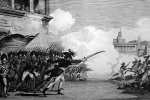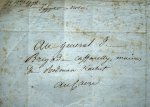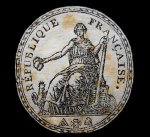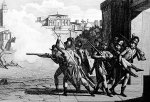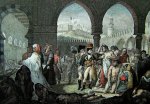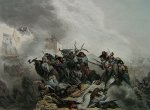Jaffa
“It is essential for us to attack the insurgent quarters.
Bombard the mosque. All armed men caught in the
streets are to be killed at sight.”
Bonaparte to Bon, October 22
Lannes was now head of the division after Vial was transferred to Rosetta. The area was still not pacified with the Mameluks controlling the areas outside Cairo. Bonaparte wanted his generals and soldiers to forget about Abukir Bay and new only one way to accomplish it, and that was march. He ordered Lannes, Reynier and Dugua to pursue the Mameluks in the Syrian territory. The small expedition chased the Mameluks without any decisive action. The Mameluks escaped into the deep desert, and Bonaparte knew that a certain death awaited the French if he went in after them. They then returned to Cairo.
The local inhabitants in Cairo were growing restless of French rule. It would soon escalate into violent street fighting led by a blood lusting mob. The revolt began on the 21st of October 1798, with religious instigators rallying their supporters to kill every Frenchman they came across. Lannes was sent into quiet the crowd in the only way he knew which was violence. Lannes and his soldiers made their way through the streets to the Great Mosque which was held by the rebels. The artillery of Dommartin was ordered up to take position, and his cannons pounded the rebels into submission. Bonaparte ordered the executions of all those involved. Lannes got the job of carrying out this order which lasted several days. After the fighting had ceased an uneasy peace entered Cairo.
In February of 1799, Bonaparte organized four divisions for a campaign in Syria. Bon, Kleber, and Lannes would follow Reynier, who would be the spear point of the campaign. After leaving Cairo, it would not take long for Reynier to come across the Mameluks who were holding a fortified position. Bonaparte sent for Lannes who had to march day and night to comply with this order, and by the time Lannes reached the Mameluk position the fighting was over.
An exhausted Lannes was now ordered to take the lead. On the 26th of February 1799, Lannes reached Gaza followed by Bon. The area was defended by 1,400 Fellahin and Mameluks. The enemy were overwhelmed when Lannes and Murat charged the defenders holding the heights, while Kleber marched straight into Gaza. Lannes fought with brilliance and was publicly commended by Bonaparte after the battle.
Bonaparte’s army reached Jaffa on the 3rd of March, and with little time to waste prepared for battle. The artillery of General Dommartin pounded the fortress walls until a small section opened, and this allowed Lannes and six grenadier companies to enter. Once inside Lannes proceeded in killing everything that moved including non combatants. On the 7th of March, Jaffa surrendered with Bonaparte being pleased that the siege lasted only a few days. The brutality of Lannes would be overshadowed by Bonaparte, because the remaining prisoners of Jaffa would be marched to their deaths along the coast of the sea.
After the battle a plague entered the French army that brought the deaths of many officers and soldiers. The surgeons Larrey and Desgenettes would use all their medical skills to keep the army intact. The French would also face thirst, heat, and raiding Mameluks as the army marched north to Acre.
“At dawn, I summoned the governor to surrender: he had
my messengers’s head cutt off, and made no reply. At
seven, we opened fire; at one, I judged the breach to be
practicable. General Lannes made the arrangements for
the attack; Adjutant Netherwood with ten riflemen led the
way. At five, we were in the possession of the city, which
was sacked for twenty-four hours and given up to all the
horrors of war, which never appeared more hideous.”
Bonaparte, March 8
THE TIMES OF LONDON
January 16, 1799
DETAILS OF THE INSURRECTION AT CAIRO.
October 21.
Towards the middle of Vendemiaire(beginning of October) measures of security induced the General in Chief to arm the Europeans, formerly established at Cairo, as well as all the French who composed the Military Administrations, and others who followed the army. Informed that a sedition was secretly planned, the General tried to prevent its evil effects, but his endeavours were unsuccessful.
On the 30th of Vendemiaire(Oct. 21), General DUPUY, Commandant of the Garrison of Cairo, being informed that a mob was forming at the Grand Mosque, mounted his horse, and went at the head of the 12th Dragoons to disperse it. The Turks in the city said, that the discontent occasioned by the imposts was the sole cause of the tumult. Meanwhile General DUPUY arrived at the Grand Mosque, and tried to disperse the mob, which increased every moment; but he found them refractory, and soon experienced their rage. He endeavoured to repel them by force, but he and his escort were assailed by a great multitude, and he was mortally wounded in two places. Some dragoons also fell, and the others conducted the General to his quarters, where he died some hours after.
This was the signal of the insurrection, and from that moment the Turks proceeded in crowds to the Grand Mosque, where they fortified themselves, armed with lances, sharp pointed stakes, and some fire arms. Their plot well laid. They did not confine themselves to assembling in a great number at the Grand Mosque, but each private Mosque formed a fortress for them, from which they directed their attack or defence. The general was soon beaten, and the troops assembled. The news of the death of DUPUY excited in the soldiers an eager desire of vengeance. Every one flew to arms, and each Frenchman joined himself to one corps or another. The General in Chief ordered a battalion to march towards the Grand Mosque, where the Turks were assembled to the number of eight or ten thousand. They were summoned to surrender, which they absolutely refused.
The citadel then fired upon the town, and chiefly upon this Mosque, into which some bombs, were thrown, which excited terror and despair. Several Battalions were disposed through the city, and directed against the other Mosques, where mobs were collected; they were attacked at the same time, and all equally repulsed: Obliged to shut themselves up in their Mosque, but it was too late, their imprudence. The French forced the gates, and made a terrible carnage among them. But though defeated, they were not beaten, the number of the dead was replaced by fresh insurgents. This day was bloody, but the following was more so. Every one found armed with a cudgel or a stake, ceased to live. The Turks, on their part, had already assassinated several Frenchmen who were found alone in the streets. The hopes of pillage animated them, and they proceeded to attack the houses inhabited by the French.
General CAFARELLI’S house was entirely plundered, and his guard and agents murdered. On the 2d of Brumaire(Oct. 23) there were still some traces of the transactions of the preceding day: but towards the evening all was calm, and tranquillity began to be restored. The loss of the Insurgents is calculated at five to six thousand, and that of the French at about one hundred men killed, and several wounded, chiefly by large stones which the inhabitants threw from the tops of their houses. In this affair the Greeks, who reside at Cairo, gave the greatest proofs of their courage and attachment to the French: one of them, named BARTHELEMY, particularly distinguished himself, and has received marks of favour from the General in Chief. They did not confine themselves to defending our cause, but pointed out those who had taken up arms, and escaped by flight. They made a great number of prisoners, and none who were found to be criminal escaped death. Some groups of the insurgents fled armed from the town, hoping to escape by a speedy flight, but they were doubly unfortunate. The Arabs of the Desert, who are equally the enemies of all who are foreign to their tribe, pillaged them, and General DANOURT pursued them closely with the cavalry. There are just grounds to presume that the Chiefs of the Religion were in concert with the Mamelukes, the instigators of this revolt: of this there are some unequivocal proofs. In consequence of the inquires which have been made several Mamelukes have been found concealed in the houses of Turks; others were dressed as women. All who were discovered in consequence of the united vigilance of the French and Greeks have been punished, in virtue of an Arrete of the Commander in Chief anterior to that epoch.
THE TIMES OF LONDON
May 1, 1799
From The Paris Papers.
BUONAPARTE’S PROCLAMATION to the EGYPTIANS.
General Buonaparte to the Inhabitants of Cairo, Feb. 20.
Wicked men had succeeded in leading part of you astray; and they have perished. God has directed me to be merciful to the people, I have been irritated against you on account of your insurrection.
I have deprived you for two months of your Divan; but I restore it to you this day. Your good conduct has essayed the stain of your rebellion. Scheriffs, Ulcmas, preachers at the Mosques, make it known to the people, that those who may declare themselves my enemies, shall have no refuge either in this world or the next! Can there exist any man so blind as not to see that destiny directs all my operations? Can any one be so incredulous as to make it a question of doubt that every thing in this vast universe is submissive to the empire of Fate? Inform the people, that since the creation of the world, it has been written, that after having destroyed the enemies of ISHMAELISM, abed laid their crosses prostrate, I should come from the extremity of the West to fulfill the talk which has been imposed upon me. Shew to the people’s conviction, that in the holy book of the Koran, and in more than 20 passages of it, what happens has been foreseen, and what will happen has been equally unfolded. Let those, then, who are prevented only by the fear of our arms from cursing us, change their sentiments; for, in addressing prayers to Heaven against us, they solicit their own condemnation. Let us true believers pray for the success of our arms. I might demand of each of you the causes of the secret sentiments of your hearts; for I know all, even what you have not revealed to anyone. But the day will come, in which all the world shall clearly see, that I am conducted by a superior order of beings, and that every human effort cannot prevail against me. Happy those who shall sincerely be the first to range themselves on my side.
(Signed)
BUONAPARTE
THE TIMES OF LONDON
August 2, 1799
To Rear-Admiral BLANKET, Commanding His Majesty’s Ships in the Red Sea, and to J. WILSON, Esq. Agent to the Hon. East India Company, Appointed by the Governor and Council of Bombay.
Tigre, St. Jean D’Acre Bay, May 16 1799.
Your Letter of 27th February, from Judda, announcing your mission from the Hon. Governor in Council of Bombay, has reached me here.
BUONAPARTE, finding his popularity and his resources to diminish in Egypt, made an incursion into Syria, in hopes to make himself master of the treasure amassed by GEZAR PASHA, and having taken Gaza and Jaffa, after a feeble resistance, advanced to this town, which he laid siege to on the 18th of March last.
The PACHA having sent me timely information of his approach, I hastened to this anchorage, and arrived before the French army time, enough to put the place in some state of defence to resist Europeans. I was enabled to furnish GEZAR PACHA with heavy guns and ammunition, without dismantling the ships, having the good fortune to intercept BUONAPARTE’S battering train of artillery on board his flotilla from Alexandria and Damietta, the whole of which, to the number of 8 sail, while they were a great loss to the enemy, afforded us the most effectual means of annoying them in their approaches. The town standing on a rectangular point of land, in the form of a square, of which two sides are washed by the sea, his Majesty’s ships could likewise afford the protection of their guns to the garrison, and to the working parties detached from them, to throw up two ravelins, which taking the enemy’s nearest approaches in flank, have considerably impeded his operations. It would be endless to enter into the detail of the events of this most singular siege; suffice it to say, we have been within a stone’s throw from each other for near two months. The enemy having very early made a lodgement on the crown of the glacis, and mined the tower, forming the inland angle of the town wall which composed of curtains and square towers, after the manner of the 12th century.
BUONAPARTE having transported cannon from Jaffa, and effectuated a breach the 14th day of the siege, attempted to storm, and was repulsed; since which he has made no less than eleven desperate attempts to carry the place by assault, in each of which he has been unsuccessful, and obliges to retire with the loss of flower of his army, and 8 General Officers killed and wounded. The army, totally dispirited and worn down with fatigue and disease, refused to mount the breach any more over the putrid bodies of their companions; they were consequently paraded yesterday, and furnished with shoes and water-gourds to enable them to cross the desart again. My emissaries in the French camp inform me that Suez is mentioned there as the object of BUONAPARTE’S speculation, though without any hopes of a disgusted, diminished, and exhausted army ever reaching it, at least in a state to act offensively. It is, however, my duty to notify this possible intention to you for your government. I am taking measures to cause an active and harassing pursuit. I trust to hearing from you by all possible opportunities through Egypt, as well as by way of Aleppo. I shall of course endeavour to keep you informed of what passes on the side the Isthmus.
I have the honour to be, &c.
(Signed)
W. SIDNEY SMITH
Sources
THE EMPEROR’S FRIEND – MARSHAL JEAN LANNES
by Margaret Scott Chrisawn
IN THE WORDS OF NAPOLEON – The Emperor Day by Day
Edited by R. M. Johnston – New Material by Philip J. Haythornthwaite
FASTES DE LA NATION FRANCAISE – 1825 Edition
by Ternisien D’Haudricourt
ATLAS to Jomini’s Life of Napoleon


